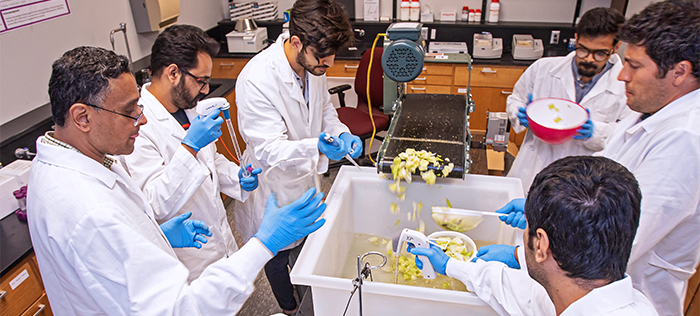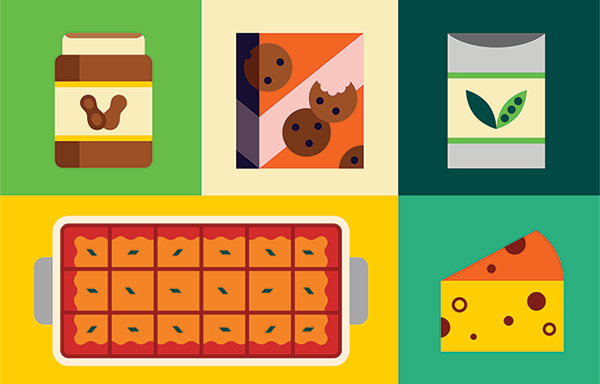
Making Food Safer
In a chemical engineering laboratory in the heart of Fenn Hall, a team of mathematics and engineering students and faculty begin an expirement that could enhance food safety.
As one person counts down on a stop watch to zero, the team springs into action. As the lettuce drops into a sanitizer bath, red leaf lettuce, contaminated with bacteria, is added, and various samples of the solution are taken to test pH levels, chlorine content and other values. The lettuce is mixed and washed quickly and then removed so more samples can be taken, as the next batch of iceberg hits the conveyor belt.
The elaborate operation is a key component of a groundbreaking research project that is designed to change the way we ensure our food is safe to eat.
The Centers for Disease Control and Prevention estimates that each year food-borne diseases lead to over 128,000 hospitalizations and roughly 3,000 deaths. Many of these illnesses can be traced to the presence of pathogens such as E. coli, Salmonella, and Listeria in fresh produce. Although interventional practices, including highly engineered and monitored washing systems, have been developed to limit public exposure to these pathogens, mortality and illness rates remain stubbornly high.
A multi-disciplinary CSU team has been awarded a three-year grant from the U.S. Department of Agriculture to address this significant public health concern. The team is developing new mathematical models designed to better assess how these pathogens spread through the food supply, and ultimately create better controls to reduce contamination.
“Ironically, the produce washing process has been identified as one of the key points of pathogen transfer in the food supply chain as contaminated produce mixes with uncontaminated food and pathogens ‘escape’ without being completely removed from all items,” says Partha Srinivasan, associate professor of mathematics and principal investigator on the project. “Our team is analyzing the chemical process to better understand how pathogen transfer occurs, while also creating better predictive models for how the entire process impacts food safety.”
Previous models designed to assess how this contamination happens have only taken a “snapshot in time” instead of modeling the entire wash system and all of its inputs, including food intake and outtake, material handling, sanitization and rinsing. This has made predictive analysis difficult at best.
The CSU team, which also includes Dan Munther, associate professor of mathematics, and Chandra Kothapalli, associate professor of chemical engineering, has addressed this by creating a fully operational produce washing system in a laboratory environment that can be controlled, tested and modified based on experimental data collected.
“Currently, we are testing whether or not pathogens present on the red leaf lettuce transfer to the ‘clean’ iceberg lettuce during sanitization,” Dr. Kothapalli adds. “We are also assessing whether changes in certain values, such as the chlorine levels of the sanitization solution, impact pathogen transfer. The data collected will enable us to develop a predictive algorithm for pathogen cross-contamination and chemical analysis of sanitizer performance.”
The team received funding from the Center for Produce Safety and is working with several produce companies to analyze data collected from large, commercial washing systems so they can compare this analysis with laboratory results.
Also in this Issue...
Addressing Food Insecurities Among Students
According to the College & University Food Bank Alliance, 36 percent of college students experience food insecurity while nine percent are homeless. Read more >>
CSU Research Team Awarded Three-Year, $1 Million National Science Foundation Grant
A team of researchers from Cleveland State University has been awarded a three-year, $1 million grant from the National Science Foundation’s ADVANCE program for a project titled Achieving Excellence and Equity through Academic Leadership Development. Read more >>
Selling Skills That Lead to Success
The Bernie Moreno Center for Sales Excellence is helping students develop the skills necessary to persuade, motivate, negotiate and influence. Read more >>



